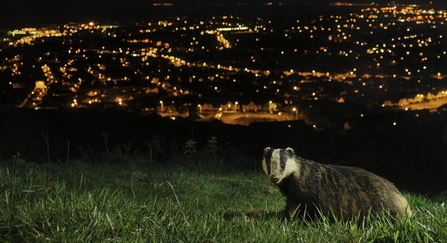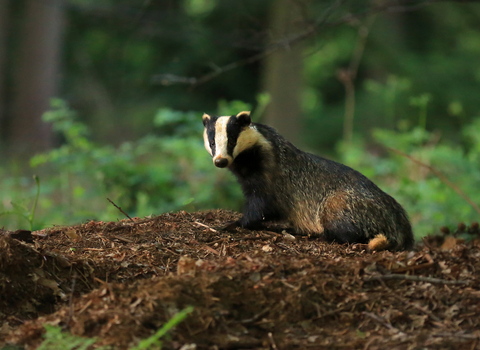Bovine TB remains a serious issue in Somerset
It can be a devastating disease that causes extreme hardship for farmers and landowners across the county. We’re firm in our belief that all stakeholders involved need to work hard together to implement a range of preventative measures to bring the disease under control which includes cattle and badger vaccination, better cattle testing, improved movement control of cattle and enhanced biosecurity on all farms.
Culling badgers, a protected species, has always been against the science. We don’t allow culling on our land. This year is the last year any cull licenses can be granted by Natural England, but existing licenses will still be valid so culling will continue until the end of 2025. No more badgers will be culled after this point. DEFRA are putting more resources into better cattle testing and cattle vaccination
Badger vaccination can be an effective measure in reducing the development and progression of the disease and reduces the spread of disease within badger populations

European Badger (Meles meles) North Downs above Folkestone, Kent, UK. Camera trap photo. - Terry Whittaker/2020VISION
Bovine TB is a cattle disease which can be passed from cattle to badger and vice versa. By reducing the prevalence of bovine TB in badgers we can expect to reduce the potential likelihood of cattle infection. We are at the start of the process, but believe that the action we are taking will prove to be a meaningful contribution towards helping eradicate Bovine TB as we await further action (and funding) by the government to support all other means of prevention.
Somerset Badger Group are the experts on vaccinations, hence why we are partnering with them to deliver any vaccination activity. The Group is run and funded by volunteers and has a widely respected reputation for dealing with all sorts of badger related issues. It works closely with the Police, RSPCA, Natural England, planning and local authorities, and in partnership with other wildlife conservation organisations.
There is lots of information on their website about their work at somersetbadgers.org.uk or for further detail please email vaccinations@somersetbadgers.org.uk
References
[1] The Government is committed to implementing its 25-year strategy to eradicate bovine TB in England
https://tbhub.co.uk/tb-policy/england/
[2] Government sets out badger vaccination licence to combat TB in England. 26 May 2022
[3] Chambers, M.A. and others (2011) Bacillus Calmette-Guérin vaccination reduces the severity and progression of tuberculosis in badgers. Proceedings of the Royal Society B: Biological Sciences, 278, 1913-1920
https://royalsocietypublishing.org/doi/full/10.1098/rspb.2010.1953
[4] Carter, S.P. and others (2012) BCG Vaccination Reduces Risk of Tuberculosis Infection in Vaccinated Badgers and Unvaccinated Badger Cubs. PLoS ONE, 7, e49833.
https://journals.plos.org/plosone/article?id=10.1371/journal.pone.0049833
Research relating to badgers and bovine TB
Below are some selected independent research papers and reports relating to badgers and bovine TB. This is not a comprehensive list.
- Winkler, B., Mathews, F. (2015) Environmental risk factors associated with bovine tuberculosis among cattle in high-risk areas, Biol. Lett. 2015 11 20150536; DOI: 10.1098/rsbl.2015.0536. Published 11 November 2015
http://rsbl.royalsocietypublishing.org/content/11/11/20150536
- Bielby, J., Donnelly, C.A., Pope, L.C., Burke, T & Woodroffe, R. (2014) Badger responses to small-scale culling may compromise targeted control of bovine tuberculosis. PNAS 111: 9193-9198.
https://www.ncbi.nlm.nih.gov/pmc/articles/PMC4078854/
- Godfray, H.C.J., Donnelly, C.A., Kao, R.R., Macdonald, D.W., McDonald, R.A., Petrokofsky, G., Wood, J.L.N., Woodroffe, R., Young D.B., & McLean, A.R. (2013). A restatement of the natural science evidence base relevant to the control of bovine tuberculosis in Great Britain. Proceedings of the Royal Society, Series B 280: 20131634.
http://rspb.royalsocietypublishing.org/content/280/1768/20131634
- Woodroffe, R., Donnelly, C. A., Cox, D. R., Bourne, F. J., Cheeseman, C. L., Delahay, R. J., Gettinby, G., Mcinerney, J. P. and Morrison, W. I. (2006), Effects of culling on badger Meles meles spatial organization: implications for the control of bovine tuberculosis. Journal of Applied Ecology, 43: 1-10. doi:10.1111/j.1365-2664.2005.01144.x
https://besjournals.onlinelibrary.wiley.com/doi/abs/10.1111/j.1365-2664.2005.01144.x
- Woodroffe, R., Donnelly, C. A., Jenkins, H. E., Thomas Johnston, W., Cox, D. R., F., Bourne, J., Cheeseman, C. L., Delahay, R. J., Clifton-Hadley, R. S., Gettinby, G., Gilks, P., Hewinson, R.G., McInerney, J. P., Morrison, W. I. (2006) Culling and cattle controls influence tuberculosis risk for badgers. Proceedings of the National Academy of Sciences Oct 2006, 103 (40) 14713-14717; DOI: 10.1073/pnas.0606251103
http://www.pnas.org/content/103/40/14713
- Bielby J, Donnelly CA, Pope LC, Burke T, Woodroffe R. (2014) Badger responses to small-scale culling may compromise targeted control of bovine tuberculosis. Proceedings of the National Academy of Sciences of the United States of America. 2014;111(25):9193-9198. doi:10.1073/pnas.1401503111.
http://www.pnas.org/content/111/25/9193.short
- Animal & Plant Health Agency. Report on the incidence of bovine tuberculosis in cattle in 2013 – 2016. Three years’ follow - up in areas of Somerset and Gloucestershire and one year of follow - up in Dorset of industry - led badger control. September 2017
- Bovine TB: The Scientific Evidence (2007) Final Report of the Independent Scientific Group on Cattle TB
- Pilot Badger Culls in Somerset and Gloucestershire Report by the Independent Expert Panel (2014)
- AHVLA Monitoring the efficacy of badger population reduction by controlled shooting during the first six weeks of the pilots (Report to Defra) (2014)
- Donnelly C. A., Nouvellet P. (2013) The Contribution of Badgers to Confirmed Tuberculosis in Cattle in High-Incidence Areas in England. PLOS Currents Outbreaks. 2013 Oct 10 . Edition 1. doi: 10.1371/currents.outbreaks.097a904d3f3619db2fe78d24bc776098.
- Defra response: Pilot Badger Culls in Somerset and Gloucestershire: Report by the Independent Expert Panel (April 2014)

